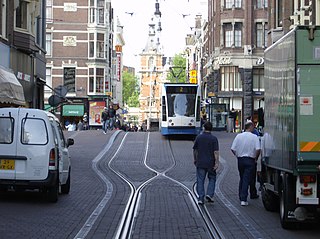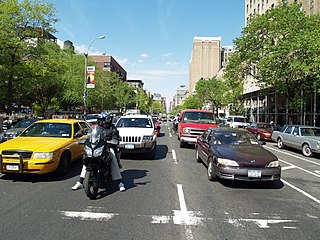Related Research Articles

Transport economics is a branch of economics founded in 1959 by American economist John R. Meyer that deals with the allocation of resources within the transport sector. It has strong links to civil engineering. Transport economics differs from some other branches of economics in that the assumption of a spaceless, instantaneous economy does not hold. People and goods flow over networks at certain speeds. Demands peak. Advance ticket purchase is often induced by lower fares. The networks themselves may or may not be competitive. A single trip may require the bundling of services provided by several firms, agencies and modes.

5-1-1 is a transportation and traffic information telephone hotline in some regions of the United States and Canada. Travelers can dial the three-digit telephone number on landlines and most mobile phones. The number has also extended to be the default name of many state and provincial transportation department road conditions Web sites, such as Wisconsin's site. It is an example of an N11 code, part of the North American Numbering Plan.

Sustainable transport refers to the broad subject of transport that is sustainable in the senses of social, environmental and climate impacts. Components for evaluating sustainability include the particular vehicles used for road, water or air transport; the source of energy; and the infrastructure used to accommodate the transport. Transport operations and logistics as well as transit-oriented development are also involved in evaluation. Transportation sustainability is largely being measured by transportation system effectiveness and efficiency as well as the environmental and climate impacts of the system.
The Atlanta BeltLine is a former railway corridor around the core of Atlanta, Georgia, under development in stages as a multi-use trail. Some portions are already complete, while others are still in a rough state but hikeable. Using existing rail track easements, the BeltLine is designed to improve transportation, add green space, and promote redevelopment. There are longer-term visions for streetcar or light-rail lines along all or part of the corridor.

A metropolitan planning organization (MPO) is a federally mandated and federally funded transportation policy-making organization in the United States that is made up of representatives from local government and governmental transportation authorities. They were created to ensure regional cooperation in transportation planning. MPOs were introduced by the Federal-Aid Highway Act of 1962, which required the formation of an MPO for any urbanized area (UZA) with a population greater than 50,000. Federal funding for transportation projects and programs are channeled through this planning process. Congress created MPOs in order to ensure that existing and future expenditures of governmental funds for transportation projects and programs are based on a continuing, cooperative, and comprehensive (“3‑C”) planning process. Statewide and metropolitan transportation planning processes are governed by federal law. Transparency through public access to participation in the planning process and electronic publication of plans now is required by federal law. As of 2015, there are 408 MPOs in the United States.

Transportation demand management, traffic demand management or travel demand management (TDM) is the application of strategies and policies to reduce travel demand, or to redistribute this demand in space or in time.

The Big Move is the regional transportation plan (RTP) published by Metrolinx for the Greater Toronto and Hamilton Area (GTHA) in Ontario, Canada. It makes specific recommendations for transit projects, resulting from seven "green papers" and two "white papers" released for public discussion. A draft RTP was released alongside draft investment strategy in September 2008. After a series of stakeholder consultations and public meetings, the final RTP was approved and published by Metrolinx on November 28, 2008.
The Lexington Area Metropolitan Planning Organization (MPO) has been involved with transportation planning in Lexington, Kentucky, USA, and its immediate area since being established in 1974. It is responsible, in cooperation with the Kentucky Transportation Cabinet, for planning and coordinating all aspects of transportation planning on behalf of local governments within its region, which includes the Lexington-Fayette Urban County Government and Jessamine County.

Halifax, Nova Scotia, is a major multi-modal transportation centre for freight and passengers in Atlantic Canada.

A traffic congestion fee will go into effect in New York City by 2021, that will charge vehicles traveling into or within a predetermined area in the Manhattan central business district. First proposed in 2007, this congestion pricing plan was approved and implemented in the 2019 New York State budget. This will be the first such fee scheme enacted in the United States.
The H-GAC 2035 Regional Transportation Plan is the long range transportation plan for the Houston-Galveston Area and serves as blueprint for further planning to be undertaken in the region over the next 30 years. The plan which was developed in a joint cooperation with Cities, Counties, Texas Department of Transportation (TxDOT) and METRO. The RTP combines research, plans and programs by various organizations into one comprehensive plan which is updated every four years. The RTP's main aim is to identify long-range transportation needs, prioritize programs and projects and to provide a forum for dialogue and regional problem solving.

The Transportation Expansion (T-REX) Project was a $1.67 billion venture that had a goal of transforming the way people in the metro Denver area commute within the areas of Interstates 25 and 225, then the country's 14th busiest intersection. The T-REX effort widened major interstates to as much as 7 lanes wide in each direction and added 19 miles (31 km) of double-track light rail throughout the metropolitan area. It's considered by some to be one of the most successful transportation upgrade projects in the United States. It also received a National Design-Build Award from the Design-Build Institute of America. The T-REX project finished 3.2% under its $1.67 billion budget and 22 months ahead of schedule in 2006 and is considered to be an example of inter-governmental agency cooperation for transportation projects for North America and Worldwide. Stakeholders have been recognized nationally and internationally for its success, including quality management.

The Tampa Bay Area Regional Transit Authority, or TBARTA, is a regional transportation agency of the U.S. state of Florida which was created on July 1, 2007. The purpose of the agency is "to plan, develop, finance, construct, own, purchase, operate, maintain, relocate, equip, repair, and manage multimodal systems in Hernando, Hillsborough, Manatee, Pasco, and Pinellas Counties." The agency coordinates its efforts with the Florida Department of Transportation to improve transportation in the Tampa Bay Area.

Historically, the harbor was the key to the Hampton Roads area's growth, both on land and in water-related activities and events. Ironically, the harbor and its tributary waterways were both important transportation conduits and obstacles to other land-based commerce and travel. For hundreds of years, state and community leaders have worked to develop solutions to accommodate both.

San Francisco congestion pricing is a proposed traffic congestion user fee for vehicles traveling into the most congested areas of the city of San Francisco at certain periods of peak demand. The charge would be combined with other traffic reduction projects. The proposed congestion pricing charge is part of a mobility and pricing study being carried out by the San Francisco County Transportation Authority (SFCTA) to reduce congestion at and near central locations and to reduce its associated environmental impacts, including cutting greenhouse gas emissions. The funds raised through the charge will be used for public transit improvement projects, and for pedestrian and bike infrastructure and enhancements.
The Tri-State Transportation Campaign (TSTC) is a non-profit advocacy and policy organization dedicated to reducing car and truck dependency and promoting a "more balanced, environmentally sound and equitable transportation network" in downstate New York, New Jersey and Connecticut. TSTC's methods include political and media advocacy including a self-published blog, original research and analysis, litigation, and community organizing.

Walter B. Hook is an urban planner and expert in the field of sustainable transportation policy and practice. Since 2015, Dr. Hook has been a Principal at BRT Planning International, LLC, a boutique BRT planning firm. From 1993 until 2014, Hook worked as the Chief Executive Officer for the Institute for Transportation and Development Policy (ITDP), a nonprofit agency that promotes environmentally sustainable and equitable transportation policies and projects in the developing world. Under the auspices of ITDP, Hook worked on the design and implementation of numerous bus rapid transit (BRT) systems in Asia, Africa, and Latin America, and is considered a leading expert on BRT design and policy. He collaborated extensively with Enrique Peñalosa, former mayor of Bogotá, Colombia, and creator of the TransMilenio, one of the world's premier BRT systems. Additionally, Hook has campaigned for sustainable transport and urban planning practices in the U.S..
Like many metropolitan regions in the United States, the San Francisco Bay Area is politically fragmented into many local jurisdictions. There is one regional transportation planning agency, the Metropolitan Transportation Commission, but there are 9 counties, 85 cities, and 16 towns, each separately responsible for making bicycle infrastructure improvements. A few of these jurisdictions publish and implement their own bicycle plans, while most defer this responsibility to the county or the region in which they are situated. Written bicycle plans are required to qualify for many sources of funding from regional, state, and federal agencies.

The Sustainable Transport Award (STA) is presented annually to a city that has shown leadership and vision in the field of sustainable transportation and urban livability in the preceding year. Nominations are accepted from anyone, and winners and honorable mentions are chosen by the Sustainable Transport Award Steering Committee.
The Metro Manila Dream Plan, formally titled the Roadmap for Transport Infrastructure Development for Metro Manila and Its Surrounding Areas, refers to an integrated plan for improving the transport system in Metro Manila, Philippines, with the hope of turning it into a focal point for addressing Metro Manila's interlinked problems in the areas of transportation, land use, and environment.
References
- ↑ "AJC Mobility 2030 Article". Archived from the original on 2006-05-29. Retrieved 2006-08-30.